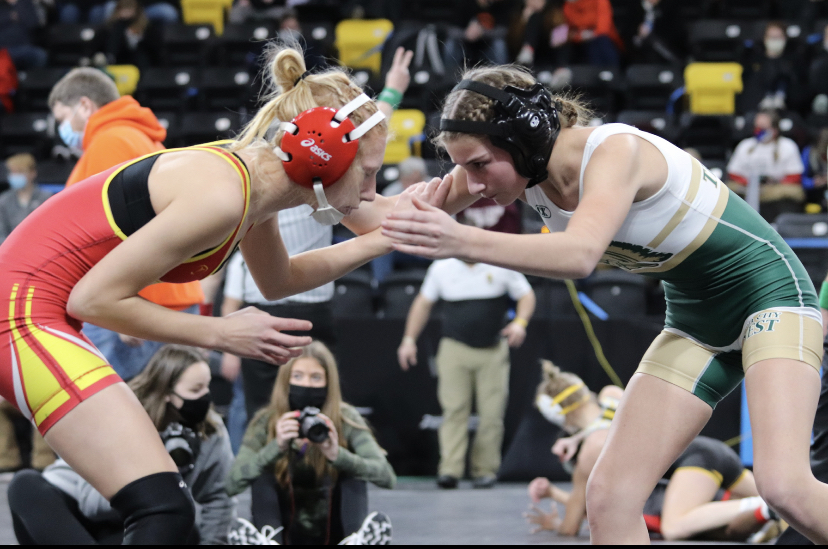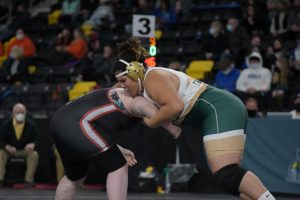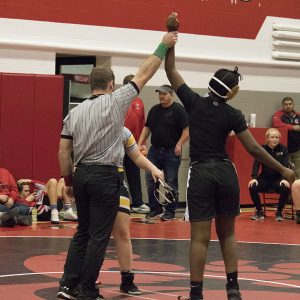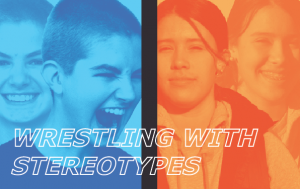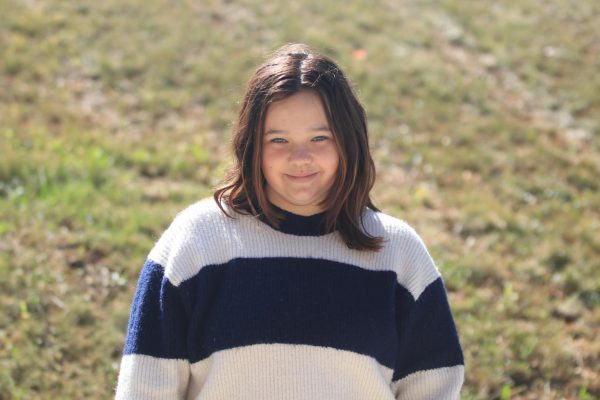Pinning stereotypes
The University of Iowa has become the first power 5 institute to instate women’s wrestling. Just down the road Iowa City West High has made a huge impact on the culture of Women’s wrestling in Iowa and has helped push the popularity and traction of the sport throughout the community and state.
Marissa Goodale ’22 stares down her opponent while wrestling at the third annual state tournament in Coralville.
November 12, 2021
Besides the rolling hills and endless cornfields, Iowa is known for its wrestling. The Hawkeye state is a factory for wrestlers with 13 Olympic gold medalists being Iowa natives. Since 1920, at least one wrestler in every U.S. Olympic team was either from Iowa or competed at the collegiate level for an Iowa University. With Iowa being ranked at number 1, Iowa State at 14, and the University of Northern Iowa at 17, you can see that the standard of success for wrestling in the state has always been extremely high.
The stereotypical wrestler has always been thought of as a strong, brawny, man. If you have ever been to a University of Iowa wrestling meet you know how loud Carver-Hawkeye Arena gets. The looks of brute strength and determination on the wrestler’s faces prove that they are ready to defeat whatever opponent comes next.
Since the beginning, wrestling hasn’t been a male-dominated sport, but a male-only sport. The thought of a female wrestler would have baffled anyone’s mind a few years ago and possibly still confuses some today. But all things are subject to change, and wrestling is no exception. Women’s wrestling is just emerging, but it is doing so at a rapid pace and there is no slowing down. (We recognize that some of the data includes people who self-identify with their biological gender over their gender identity.)
32 states have High School wrestling state championships, including Iowa. Last year alone over 600 girls participated in Iowa’s state tournament. Although girl’s wrestling is still not sanctioned by the Iowa Girls’ High School Athletic Union, the Iowa Wrestling Coaches and Officials Association still sponsors the state tournament.
“My goals for this sport is for it to continue to expand and eventually become sanctioned in Iowa,” said Ava Davis ‘22 who started wrestling her sophomore year, the very first year of the program, and has seen the growth since the very first girl’s wrestling season back in 2019.
For so long wrestling was just a sport for girls to spectate, “Since I was little, I attended my brothers’ wrestling meets and I always wanted to wrestle alongside them,” said Davis. “When I got the opportunity to wrestle in a girls’ division, I didn’t even hesitate to join.”
The thought of girl’s wrestling is still something extremely foreign to the 18 states that have not yet recognized it as a high school sport, but Iowa does not have that problem. West High is seen as a trailblazer for the sport, considering it’s a large school up the street from the wrestling powerhouse that is the University of Iowa. West High’s program also gained attention when one of our women’s wrestlers, Salima Omari ‘20, won one of the first Iowa Highschool women’s wrestling state championships back in 2020. The program’s success in their first year made people take the sport more seriously, and more eyes turned to the female wrestlers of West High.
Breaking barriers for females in a disproportionately marginalized sport doesn’t stop when you graduate from West. For Phoebe Burt ‘21, her wrestling career at West was just the beginning. Burt and Omari are both part of the women’s wrestling team at William Penn University. The university is only one of 36 NAIA (National Association of Intercollegiate Athletics) teams with a women’s wrestling team. “I feel as though people are more interested in watching the women’s program here at William Penn at least because not every school has a women’s program and you don’t see it every day” explained Burt.
The 36 NAIA teams are joined by 13 division two teams and 22 division three teams in filling the gap for collegiate women’s wrestling. These teams are making great strides in boosting the popularity of the sport and crushing the wrestling stereotypes. But there was a great disparity when it came to the popularity of women’s wrestling, a major university had not yet sanctioned it as a sport. There were no Division one women’s wrestling teams and this was contributing to the lack of popularity within the sport. That is until the University of Iowa broke that trend.
On Thursday, September 23, 2021; the University of Iowa became the first division 1, power 5 institution to make women’s wrestling a sport. This decision was huge as it will increase the popularity of the sport and serve as a wake-up call for people who may be hesitant about the idea of women’s wrestling.
6 minutes away from Carver-Hawkeye Arena, where the first power 5 women’s wrestling program will be practicing and holding meets, is West High. Even though the decision was ultimately made by the university, West High and the young yet successful women’s wrestling program pushed the popularity of the sport through the community and through young women who are looking for the chance to strap on their headgear.
“Iowa instating Women’s wrestling will not only give Iowa girls an opportunity to be a part of the Iowa sports community, but it will give them more opportunities in achieving their goals and reaching higher levels of achievement (within the sport).” said Davis.
The excitement is shown for this decision not only with the high school girls awaiting the next level of competition but also in the colligate athletes that have grown with the sport.
“I am so excited to see that women’s wrestling is finally getting put into a position where it is now, in the spotlight. I hope the program gives girls the courage to come out for wrestling,” said Burt.
But the work doesn’t stop here. The sport still has a long way to go not only collegiately but also at the high school level. When asked about what their hopes for the future because of the University of Iowa’s decision, both Davis and Burt explained their goals for the sport being sanctioned at the high school level.
Although the state of Iowa has a state tournament for the sport, it is still not sanctioned as an official high school sport by the Iowa Girls High School Athletic Union (IGHSAU). The sport being sanctioned by the union means schools being able to have official girls wrestling teams and the wrestlers being able to have the support of the organization that supports all of their peers. The IGHSAU needs at least 50 schools to sign off on having a women’s wrestling team before it is sanctioned. The arguments for the sanction have picked up major steam and have shown people that there are people out there that want to participate in the sport and there is a community behind this sport.


